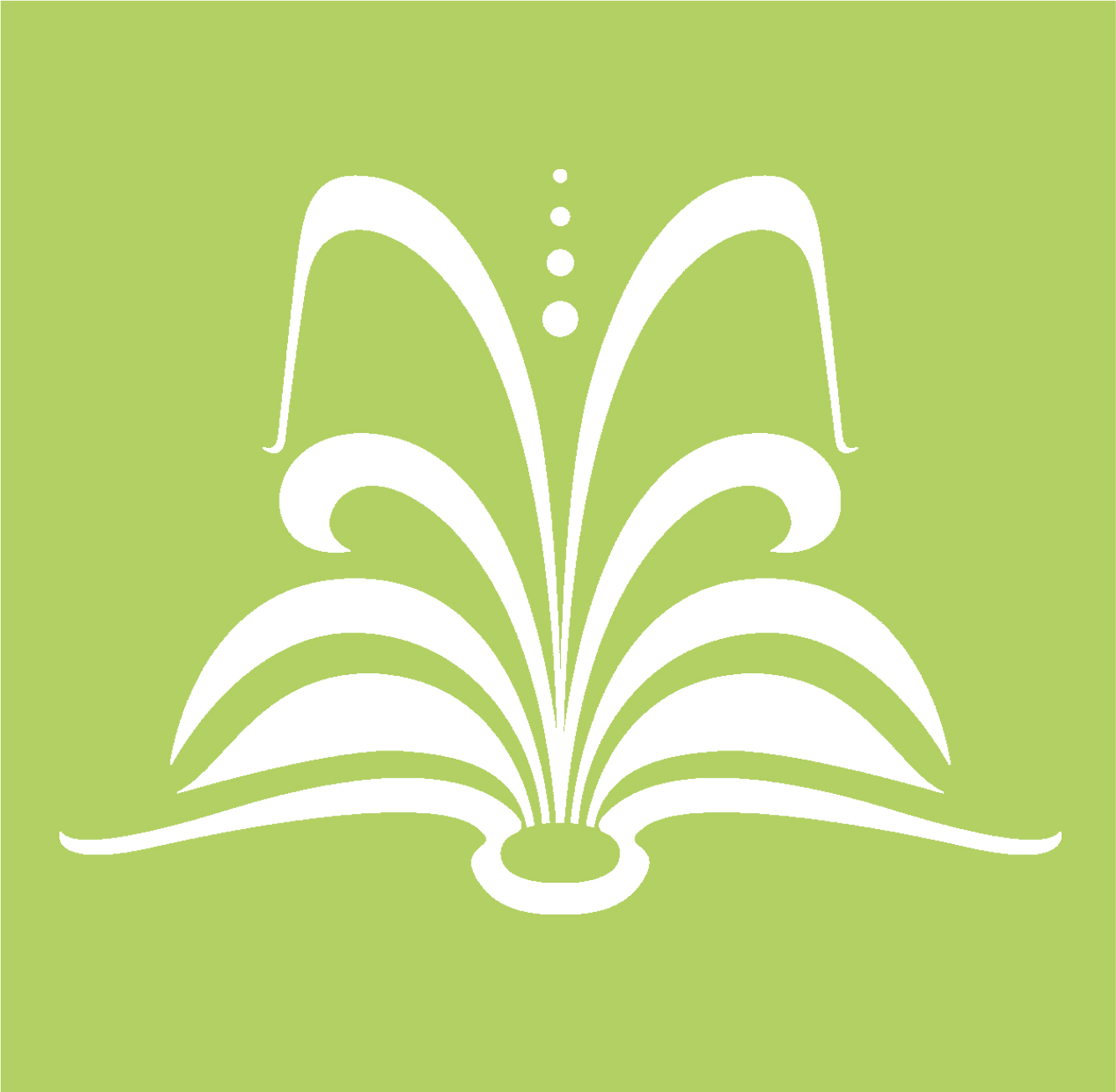by Lisa Di Tommaso | Jun 15, 2024 | Blog, Exhibition

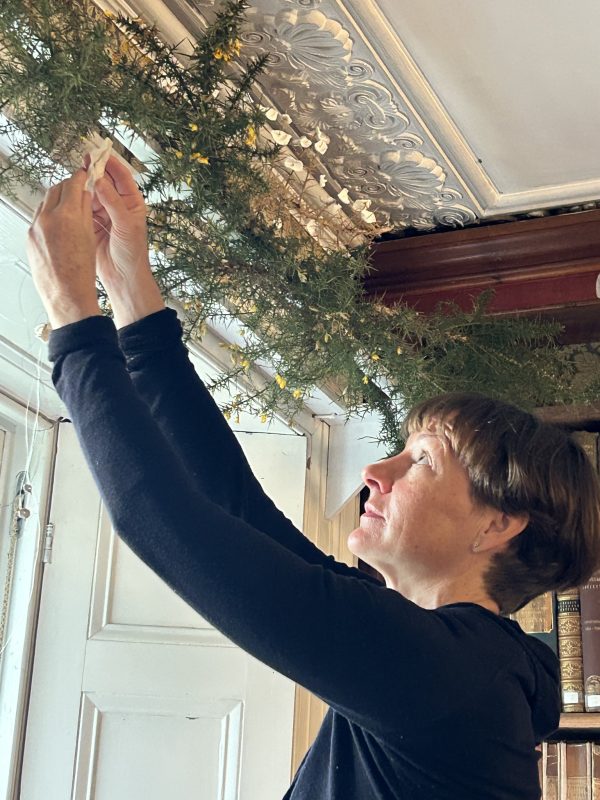
Artist Rebecca Harvey and poet Lucy Sparrow are joint Artists in Residence at The Morrab Library. Throughout the year, the pair are creating pieces in porcelain and poetry inspired by the library’s rooms, collections and atmosphere.
If you have visited the library recently, you may have paused on the staircase to read Lucy’s latest poem, ‘a living library’ which slinks along the stringer up to the top of the stairs. At each tread, a new line is added to the poem which grows as you climb, repeating itself in a calming refrain up to the landing, from which you can see the room where Lucy first drafted the piece.
Lucy says “‘a living library’ was written in the Poetry Room in The Morrab Library late one sunny afternoon in January 2024. In an armchair surrounded by shelves of books and art works, looking out through an enormous window into the surrounding garden, I felt an intense sense of serenity and connectedness.”
Through their residency Lucy and Rebecca seek to bring to life and shine attention on unexpected places around the building, illuminating quiet corners, treasured reading spots and places of contemplation.
Lucy adds, “The library, crammed with treasures and always welcoming, opens up as a safe yet stimulating space nurturing learning, creativity and reflection.” Through her poem she hopes to “convey the essence of the library, its energy and life revealed through presence and purpose, by the library staff, library members and visitors in this very special place.”
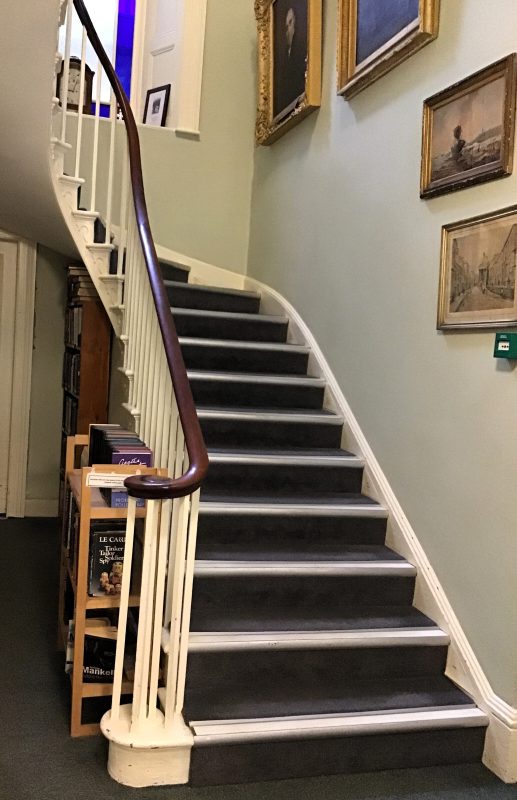

Lucy’s poem is depicted in another form by Rebecca Harvey’s work in the Rees Room, just off the landing. Rebecca works in porcelain and for this new piece she has painted with Cornish clay slip onto the glass panes and has written ‘a living library’ through the clay, letting the light stream through the words.
Sitting at the desk in the Rees Room, surrounded by French fiction, Pelican books and texts in a whole host of languages, you can look out of the window through the poem, or watch the afternoon light play through its letters.
Rebecca describes her process and the inspiration behind the piece below:
“At the top of the stairs I gravitate towards the intimate Rees room as it holds assorted memories of being the first that I spent time in with my young daughter after the first lockdown. The window invites a gaze towards the living life of Penzance, palm trees, close knit houses, sky and drifting interior thoughts.
The pane of glass echoes the page.
The materiality of locally dug kaolin references its granite source and traditional use in paper making.
Textures of brushstrokes soaked in clay, are drawn across the transparent glass and slightly conceal the exterior.
Energy held in the edges of the brushmarks are left, partly inspired by the slightly torn and ruffled edges of a WH Davies book. This book is so beautifully illustrated and belonged to a member of the The Penwith Local History Group who are researching a creative Hilda Quick collection held in the archives.
A sequential gesture of the handwritten words holds the fluid rhythm and pattern which are revealed through the transparency of glass.

Like the poem this understated composition has taken on many permeations before arriving with a somewhat simple interpretation of ‘A Living Library”.”
Lucy and Rebecca’s previous pieces were installed in the Reading Room and you can read about their work in our previous blog post. This summer, Lucy’s poem guides the library visitor gently up from the ground floor and Rebecca’s next porcelain installation can be found in the Rees Room window (upstairs). You can also pick up a copy of Lucy’s poem to take home from the table on the landing.
The installations are open for members and non-members alike to visit during Library opening hours (10-4, Tuesday-Saturday).
by Lisa Di Tommaso | Apr 26, 2024 | Blog
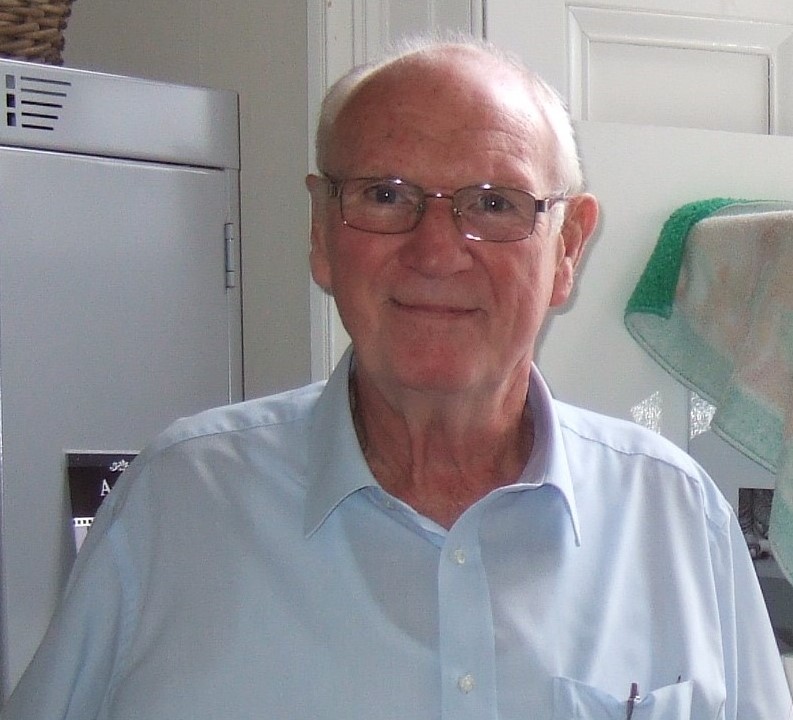
The library has lost a most valuable and supportive friend with the recent passing of Glyn Richards.
For many years Glyn served as a trustee. Polite and always ready to give of his best, he contributed his local knowledge in committee meetings and until quite recently would work hard on necessary tasks during social events.
Glyn was active in developing the Photographic Archive, appending details to many vintage images over many years, and was an important member of the team. He attained a good knowledge of I.T. and contributed to workgroups in the Penlee Gallery. Glyn also maintained a productive relationship with numerous Cornish historians and was generous with his time to anyone making enquiries or requests.
He also contributed to the works of the Penwith Local History Group. Having worked as a nautical engineer on ships of the Merchant Navy he was a rich source on all matters of the sea. He was especially close to his grandfather, who worked as a sail maker, and Glyn treated the Group to stories relating to his forebear, being licensed as an apprentice and the earnest commitment this entailed. He had a detailed knowledge of the quarry railway, and having worked with the team, the fishing protection vessels. He had an interest too in visual arts, the Newlyn Art Group and their domiciles, and was an authority on Myrtle Cottage.
Not only did he know the best place to get a pasty but if you went along with him you would notice the affection with which he was served. He was active at the Newlyn Trinity Centre and contributed with his customary conviviality. We have lost a huge fund of knowledge and a wonderful friend.
Written by George Care.
by Lisa Di Tommaso | Feb 13, 2024 | Blog, Events, Morrab Library, Uncategorized
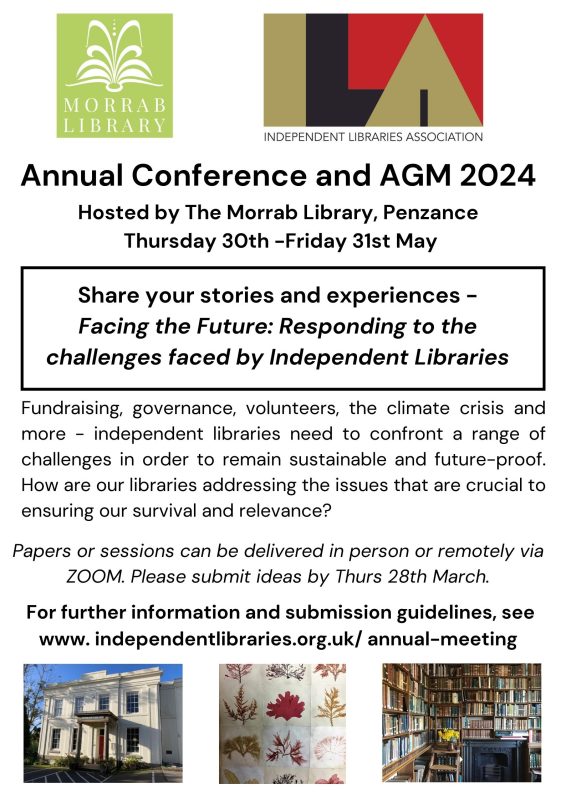
We are delighted to invite you to take part in the ILA Annual Meeting, to be held on the 30th and 31st May at The Morrab Library in Penzance, Cornwall.
Library staff, trustees, and volunteers are all welcome to deliver a paper, lead a discussion, or share your experiences around the theme of “Facing the Future: Responding to the challenges faced by Independent Libraries”, either in person, or via ZOOM.
Fundraising, governance, volunteers, the climate crisis and more – independent libraries need to confront a range of challenges in order to remain sustainable and future-proof. How are our libraries addressing the issues that are crucial to ensuring our survival and relevance? Proposals could include:
- Successful fundraising projects at your library, large or small;
- Tips and tricks on writing successful fundraising applications;
- Encouraging and supporting volunteers in the various roles they play;
- Managing a significant volunteer project;
- Experience of making old and even listed buildings more environmentally sustainable;
- How good library governance can support change management.
We emphasise that your paper, or the session you lead, does not need to be scholarly, and all staff, trustees and volunteers of independent libraries are welcome to deliver sessions.
We would love to welcome you and help to share your stories about the wonderful world of Independent Libraries!
We shall open up bookings for attendance at this hybrid event at a later date.
We look forward to hearing from you.
by Lisa Di Tommaso | Nov 23, 2023 | Blog
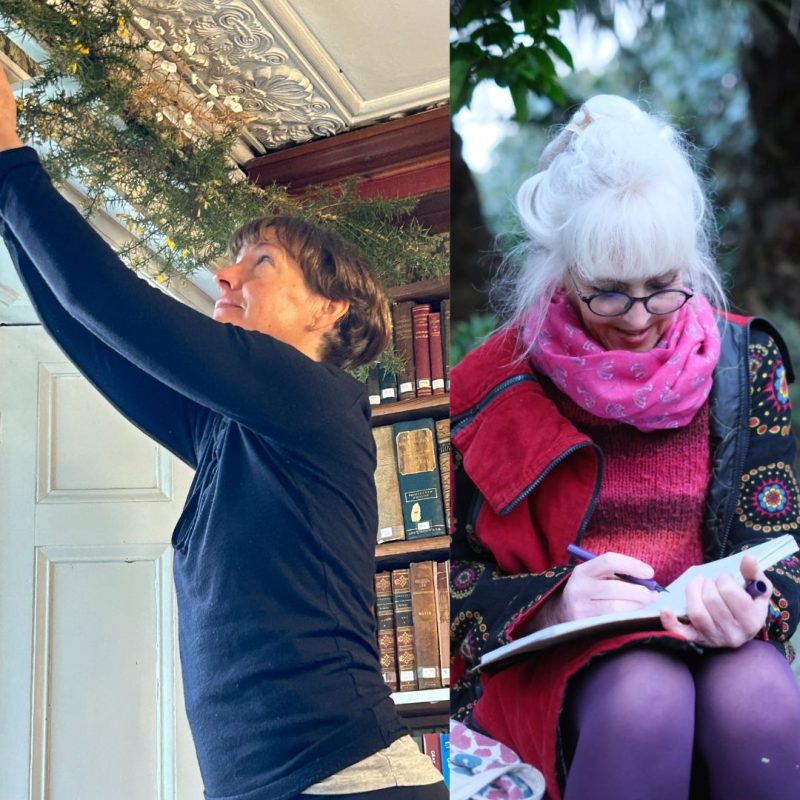
We are delighted to announce that Rebecca Harvey and Lucy Sparrow are our new Artists in Residence from November 2023 into 2024.
Their joint residency is titled “Revealing Morrab Library: Poetry & Porcelain” and will draw from their respective disciplines. Rebecca Harvey is an artist working in porcelain and Lucy Sparrow is a poet. They are both members of The Morrab Library and it was spending time amidst the bookshelves of the library which inspired them to work together. Their creative affinity has manifested in, as Lucy describes, “a collaboration of porcelain and poetry”.
Over a period of time, members and visitors alike will spot installations taking shape and evolving in various unexpected places throughout the building. Work will draw on the themes of the different collections within each room, revealing and illuminating features of the spaces in which they are sited as well as their interplay with the surrounding gardens beyond the windows.
The pair agreed that “Morrab Library is More than Books. Whilst it is an archive of treasures revealing the past it also embraces the contemporary speaking to the future” (italics here are a reference to the Treasures of the Morrab: A Penzance Library That Has More Than Books (2005, p. 31) by Penwith Local History Group).
Through their residency they hope to “to raise awareness within the local community and beyond of the library’s rich diversity of resources and archive”.
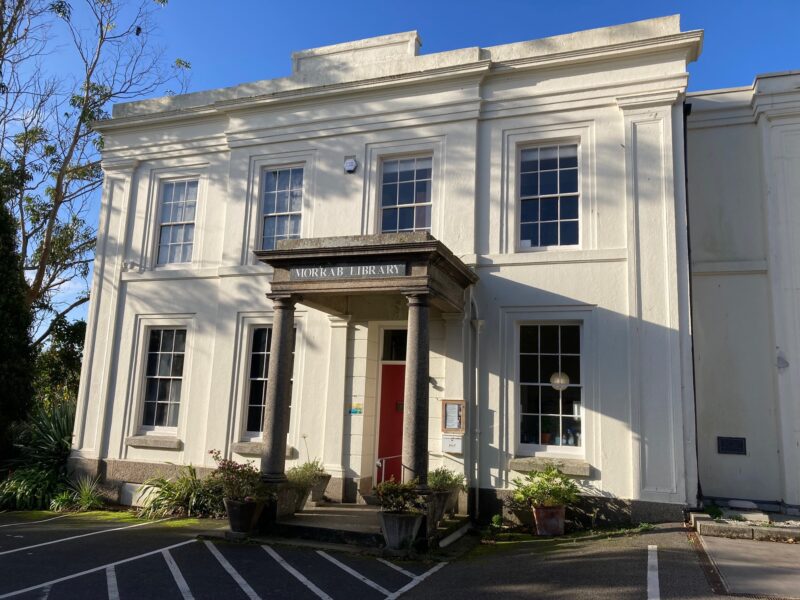
Lucy Sparrow evocatively describes the character of The Morrab:
“Morrab Library and Gardens is such a special place. The gardens are achingly beautiful in Spring and Summer and people picnic or read or just lie on the grass cloud watching. Inside the library rooms steeped in history buzz with members, volunteers and visitors attending workshops, lectures, residencies and exhibitions. Books are browsed, borrowed and bought. Laughter, chatter and silent corners co-exist, there is a warm, quiet energy. Morrab Library is a living library where the past can be preserved, examined and re-evaluated to inform and illuminate the present. This is made achievable by the commitment of the library staff who work tirelessly to keep this wonderful institution accessible and relevant.”
At the moment in the Reading Room (Ground Floor) Lucy’s poem is titled ‘Her Installation’. It is about a mother’s experience of war, loss and survival. She wrote it after attending writing workshops in the Reading Room, coupled with the experience of seeing Rebecca’s porcelain sculptures in her studio.
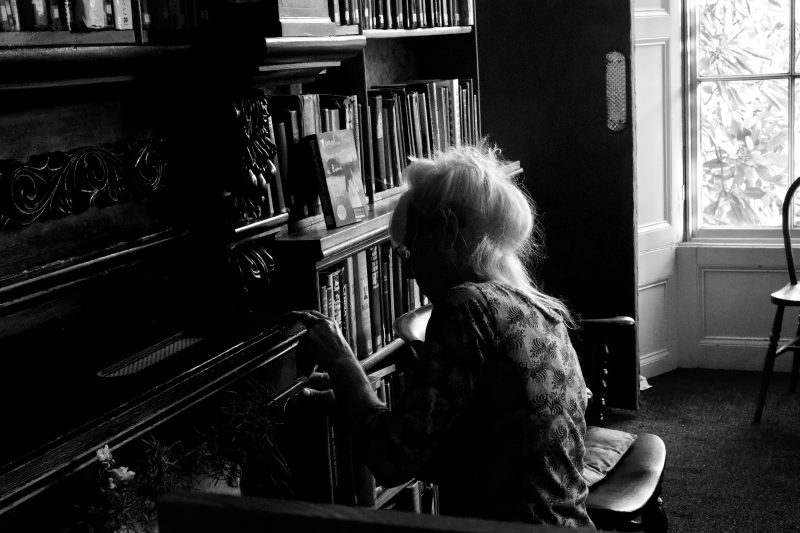
The installations seek to reveal spaces unseen or overlooked. Rebecca describes the way in which she hopes that their work will draw attention to things that people may not have noticed, “to stop and really look at something and think about the interlinked nature of things and that everything is interwoven”. Lucy adds, “In the history room, barely noticed between and beyond the spines of dictators is a rather ornate fire-place now cold, boarded up, blackened. Here, the energy of grief expressed in poetry hangs, visible, surrounded in the room by strung porcelain sculptures. This simple domestic space with its picture frames on the mantle-piece reveals the hidden history of an individual and yet has wider connotations contextualised by Auschwitz and the Crimea. In this first installation the past is revealed afresh in the present through the window of collaborative contemporary art.”
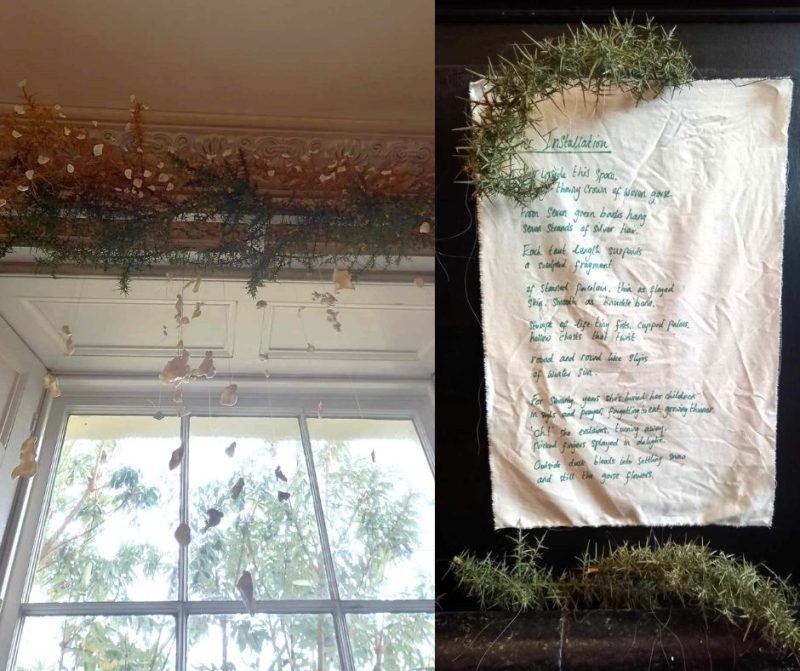
Rebecca’s first piece has been inspired by Lucy’s poem and similarly draws from the collection of books it is held within, without being directly representational. It is titled “Yet the Gorse Flowers”, and is site specific, made from gorse collected over the year, porcelain, local wild clay and horse hair. Suspended in one of the windows of the Reading Room, on the threshold between inside and outside, porcelain petals, skin or bone-like structures catch in the sunlight. The work explores the materiality of porcelain, from raw to fired, translucent to dense. The installation is intentionally a work in progress and will evolve in response to its location throughout the next few weeks.
Rebecca is an alumni of the Royal College of Art working primarily in porcelain and represented by the Belgrave Gallery. A grant from the Arts Council to develop her creative practice first drew her to the Elizabeth Treffry Room, to browse this special collection of books by and about women in Cornwall, donated to The Morrab Library by The Hypatia Trust. The room contains lots of books about Virginia Woolf, as well as beautiful editions of her work, and spending time in this space inspired Rebecca to think about a residency in the library.
Rebecca first visited The Morrab as a child, as part of a regular Sunday walk with her grandfather, through Penlee Park, to Morrab Gardens and on to St Mary’s Church. She has early memories of being tiny here; gazing up at the floor to ceiling bookcases in awe. She has always had a multigenerational experience of the library and has passed down the connection to her daughter, regularly popping in to borrow books, attend classes and workshops, and recently enjoyed a visit to see the collection of pressed seaweeds.
Penzance is Lucy’s home town and she also remembers visiting The Morrab Library as a child. She re-discovered The Morrab Library when attending writing workshops and lectures as part of Penzance Literary Festival. She says, “The first time I walked in I recognised a librarian from school! The library exudes a sense of timelessness and relaxed ambiance. It appeals to all readers of all ages offering quiet places to sit and read or think whilst also encouraging new writers, artists and historians to attend talks or share and explore its environs.”
Lucy studied English and History at University and in her professional role as a nurse has maintained an interest in these subjects.
She says “Literature and writing have always been an important part of my life but recently the focus has shifted from a therapeutic function to creative experimentation. I am currently working on a collection of poems for publication. Spending time with Rebecca in her studio, surrounded by her porcelain, I saw an affinity between this material and human bone and skin, in texture, shape and translucence. We bury our bones in the earth and from this we extract clay. Through this conversation came the idea of the current collaboration.”
The pair hope that their collaborative residency will help to illuminate what a “rare and special place Morrab Library is” and “actively support its continued presence within Penzance”. You are warmly invited to a ‘drop-in’ session held in the Reading Room on the 15th December 10-12: pop in to see their work and chat to them more about their creative practice.
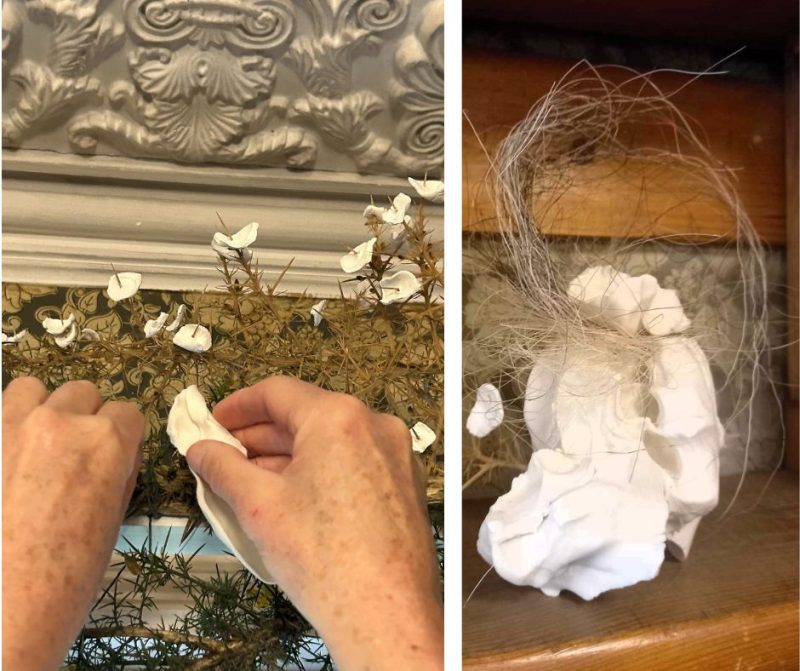
by Lisa Di Tommaso | Nov 22, 2023 | Blog, Morrab Library, Sale, Uncategorized
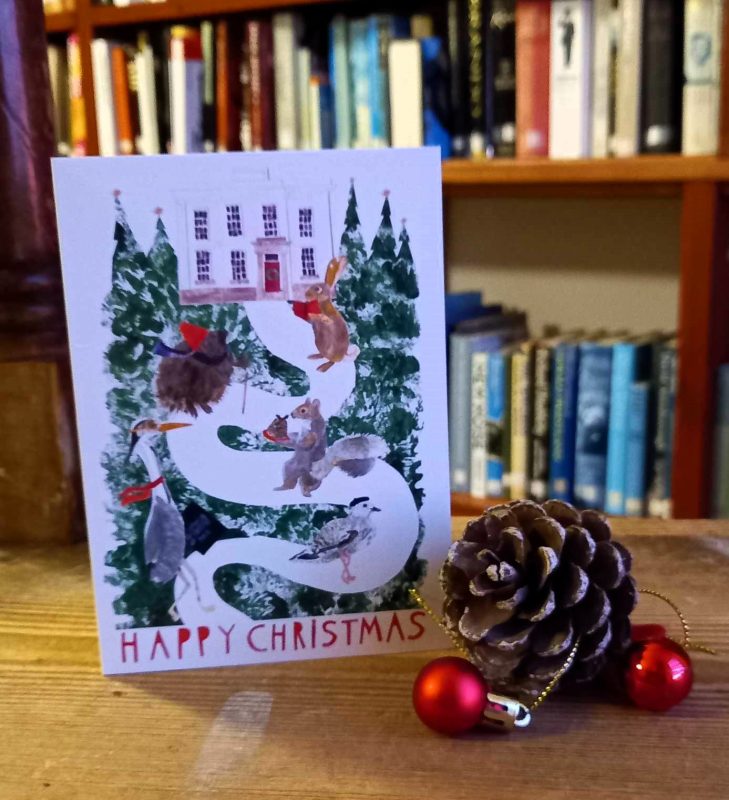
This year’s Morrab Library Christmas Cards are now on sale, featuring a beautiful image by own staff member Harriet.
You can purchase them from reception at £1.00 per card, £2.75 for a pack of three, or £4.75 for a pack of five.
All proceeds go to the care of the Library.
We’re happy to post cards to you for a small additional fee if you can’t make it into the Library.
Illustration: @harrietjadeharrow






